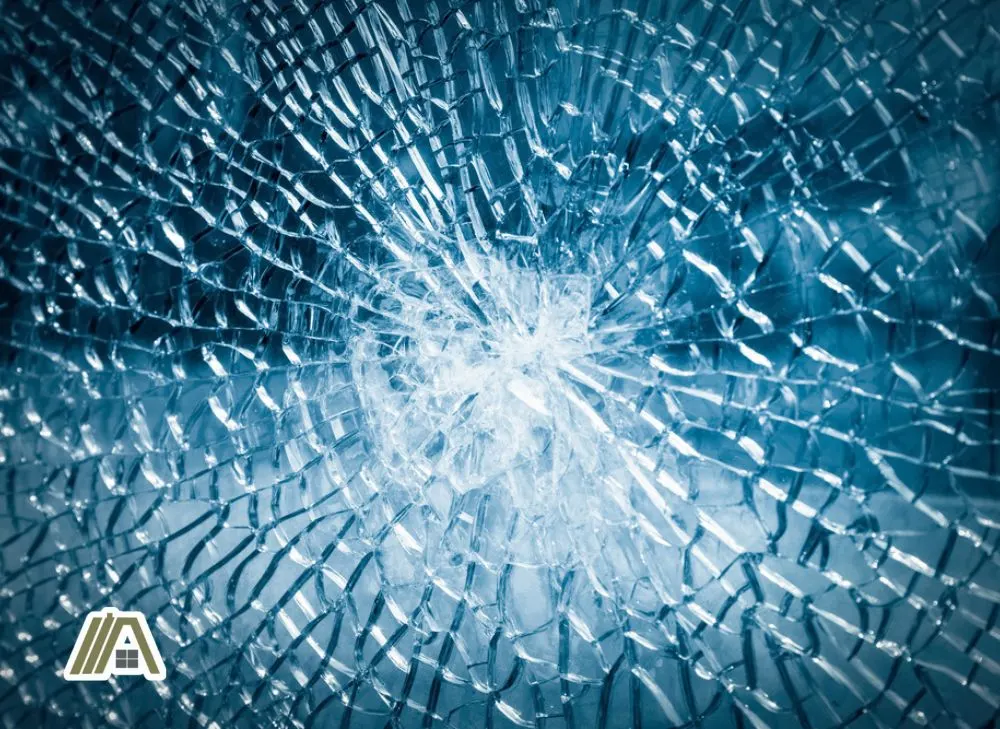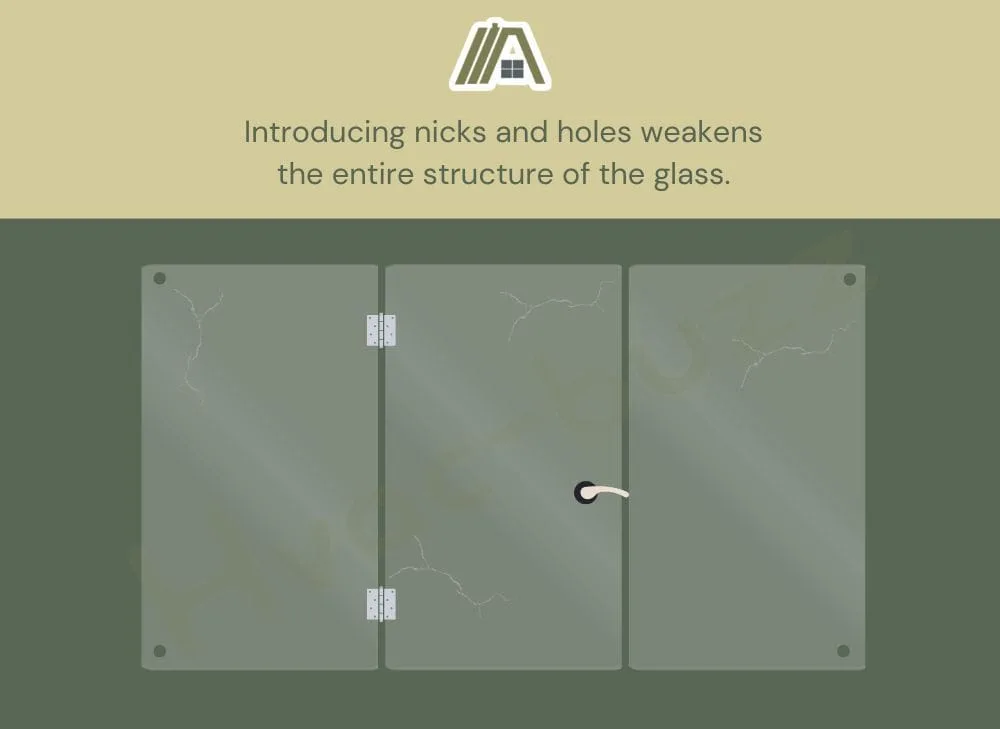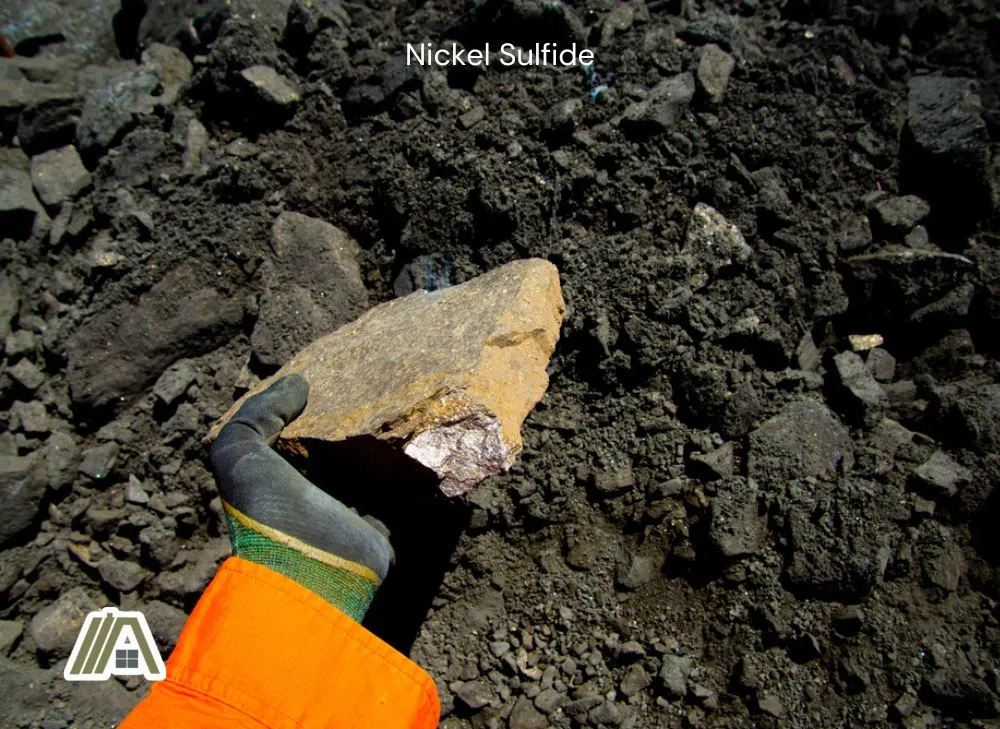All around the world, there have been news stories of glass shower doors exploding in the middle of the night or while they are in use. Some blame the manufacturers, and some think the cause may be rooted in some form of user error.
To understand why shower doors explode rather than crack into jagged pieces like normal glass, you must first understand the concept of safety glass. Theories for why this type of glass explodes include temperature changes, faulty installation, and more.

Glass shower doors can break suddenly as a result of thermal expansion, nicks in the edges of the glass or drill holes, improper installation, and or nickel sulfide inclusions. The doors explode or shatter rather than crack because they are made of tempered glass.
Shower Doors Are Made of Safety Glass
All shower doors are made of glass. It is safety glass, but this name can be slightly misleading.
Safety glass is a product that must balance two aspects: strength and safety.
Glass that is too weak will break easily and is more likely to harm those near it. On the other hand, glass that is too strong is more likely to cause injury because it will crack rather than shatter. The pieces will also be jagged shards rather than tiny, relatively harmless pieces.
To balance both strength and safety, the glass must be strong but not too strong.
Safety glass is often tempered, or exposed to extreme heat and then immediately cooled for an extended period of time. This process makes it so that the glass, when broken, will break into pieces that are not jagged and less likely to harm someone seriously.
Unfortunately, this often manifests as a messy explosion that you then have to clean up.
It is important that shower doors are made of safety glass because in the event of the shower door breaking while you’re in the shower, especially if you fell into the door to break it, the safety glass can prevent serious injury.
In the case of someone falling into the shower door and breaking it, rather than creating a hole outlined by jagged shards that you will cut yourself on, the entire door is likely to shatter, leaving pieces that are not likely to hurt you and a metal frame without jagged shards of glass on it.

Tempered glass is also just less likely to break with impacts to the broad side of the sheet of glass.
Thermal Expansion Can Make Glass Explode
All materials can go through thermal expansion but some handle it better than others.
Glass, because it is so rigid and brittle, doesn’t handle thermal expansion well, causing the glass to explode.
The process of thermal expansion, put simply, is when the individual atoms of a material vibrate faster because the heat is giving them more energy. Because they are vibrating faster, they are moving around more, which causes them to take up more space.
When a brittle or rigid material goes through thermal expansion, each atom taking up more and more space does not work well, since the material cannot move much without breaking. The substance will continue to grow slightly in size until it undergoes too much stress.
The glass atoms’ vibrations reach their breaking point at around 300 ℉. At this point, the glass cannot handle any more of a change in size, so the glass breaks and shatters.
It is not likely for your shower door to reach this high of a temperature since water this hot would lead to terrible burns.
It is more likely that, after years of wear and tear, high temperatures of water, although not as high as 300℉, could cause the glass to shatter since it has already experienced a fair deal of stress (the contraction of the glass as it cools adds to this stress).
Your shower door is more likely to shatter due to thermal expansion if you take very hot showers, especially if the water sprays directly onto the glass.
These odds rise even higher if your bathroom is not well-ventilated or the bathroom fan doesn’t run long enough to dissipate heat, so your bathroom experiences high temperatures for prolonged periods of time.
To minimize these risks, don’t take extremely hot showers often and be sure that your bathroom fan is able to reduce the heat in your bathroom substantially.
Nicks in the Edges/Drill Holes Cause Breakage
Small nicks in the glass and drill holes introduced during manufacturing or installation may not cause shattering right away, but the glass certainly doesn’t come out stronger because of it.
Instead, introducing nicks and holes weakens the entire structure of the glass. The weakest part of tempered glass is at the edges, along the narrow sides.

Similar to thermal expansion, this is because glass is so rigid and brittle. While malleable and less rigid substances can withstand some stress, glass cannot handle much.
The nicks and holes in the glass introduce stress that will only get worse with wear and tear, such as bumping into the glass and temperature changes.
This is fairly likely to be the cause of your shower door suddenly shattering, especially if your shower door has drill holes to install it rather than a metal frame.
If your shower door has nicks from wear and tear or has drill holes, handling the shower door roughly and taking very hot showers can increase the risk of the shower door exploding.
You can reduce the risk of your shower door shattering by treating it gently and not taking too hot of showers. You may also reduce the risk by purchasing a framed shower door that does not have drill holes.
Improper Installation Leaves Glass Vulnerable
Although user error can partially be blamed for shower doors suddenly exploding, it is also possible that the phenomenon is caused by improper installation.
This can include using damaged parts and pieces such as hinges and runners. Even if faulty parts weren’t used, the shower door might be installed crooked or loosely.
Both faulty parts and bad installation can cause the shower door to slip off of its track or even out of its hinges.
Although the first time the shower door has an impact with the ground it is not likely to shatter (unless you hit it at the right point), after repeated impacts with the ground due to poor installation, it is likely to accumulate more and more stress and eventually shatter.
The likelihood that your shower door is installed improperly is low since most installations should be done by professionals, but unfortunately, mistakes and laziness do happen.
It is also important to note that improper installation as well as nicks, holes, and extreme temperatures can all combine into a situation where your shower door is not likely to last long.
In order to lengthen the life of your shower door and save yourself some trouble, be sure to look at the reviews of the products and installation professionals before committing to them.
Also, as is the case with the previous situations, be sure to minimize wear and tear by being gentle with your shower door and not subjecting it to extreme heat.
Nickel Sulfide Inclusion Can Cause Sudden Breakage
Impurities in the glass, which can also be called microscopic pebbles or nickel sulfide, can cause the sudden breakage of your shower door when temperatures change in your bathroom.
Even without extreme temperatures, shower doors can experience thermal expansion as the bathroom heats up and cools down.
As the temperature rises, the glass and the nickel sulfide expand. As the temperature falls, the glass and nickel sulfide contract.

In well-manufactured glass, these minor changes in temperature and minor changes in size impact the stress of the glass very little.
However, in poorly-manufactured glass with nickel sulfide, the pebble expands and contracts differently from the glass, and the glass around it weakens and builds stress. When this stress is high enough, the entire glass door can explode.
This is more likely to be the cause of sudden breakage if the shower door was cheap. Unfortunately, cheaper shower doors are more likely to experience poor manufacturing. This means that they are more likely to have nickel sulfide inclusions.
Both wear and tear as well as rapid or intense temperature changes will lead to the pebbles in your shower door causing breakage.
To try to minimize the possibility of the nickel inclusion causing the shower door to explode, it is important to handle the shower door gently and keep your bathroom well-ventilated, which is what a bathroom fan is necessary for.
You can also minimize the risk of your shower door exploding by researching shower doors and making sure that the company manufactures its glass well.
Sources
https://info.glass.com/what-causes-glass-shower-doors-to-explode/
https://roomtorooms.com/blogs/news/shower-doors-exploding-how-to-prevent-a-disaster

